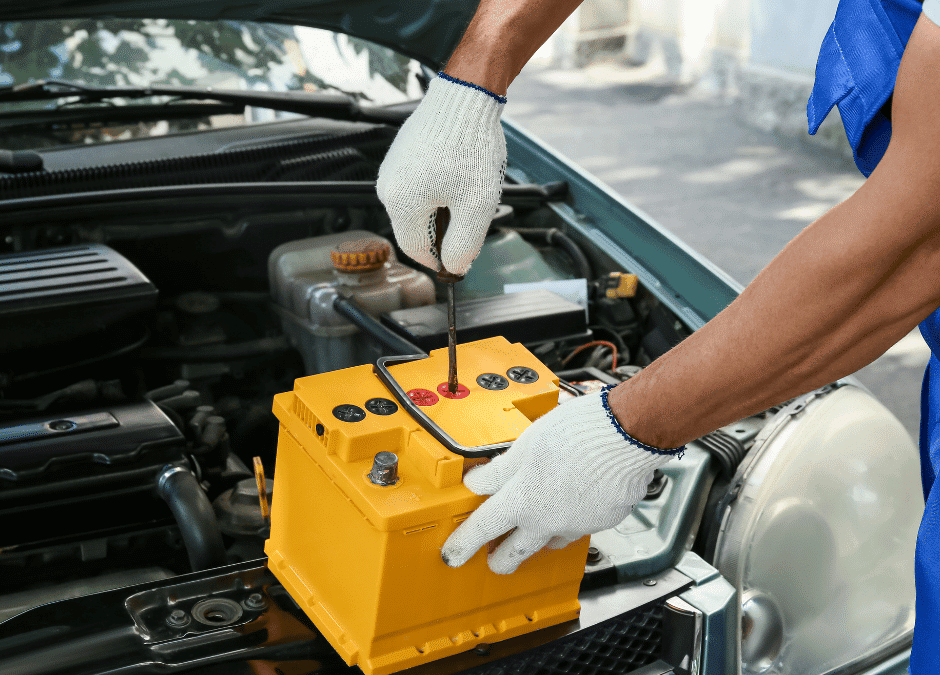Every driver in Peachtree City understands the significance of a reliable car battery. It’s the heartbeat of your vehicle, initiating your engine, fueling the electronics, and, essentially, ensuring a smooth journey from point A to B. But what happens when this critical component begins to fail? A faulty battery can turn your daily commute into an unexpected hassle. Let’s delve into understanding bad battery symptoms so you’re never left stranded!
What Causes a Battery to Go Bad?
Several culprits can shorten your car battery’s life. The ravages of time are a primary factor; nothing lasts forever, not even the best batteries. Extreme weather conditions, particularly the sweltering Peachtree City summers, can wreak havoc on your battery’s health. Couple that with human errors like leaving your car lights on overnight or enduring a faulty alternator, and you’ve got a recipe for a dying battery.
What Happens When Batteries Go Bad?
When car batteries falter, so does your vehicle’s reliability. It begins with subtle signs, maybe a sluggish start or dimming lights. But left unchecked, a failing battery can lead to more than just an inconvenience—it can pose safety risks. Imagine being stranded on a lonely road at night or the danger of a leaking battery! Understanding and acting on these signs is crucial.
Signs Your Car Has a Bad Battery
Early recognition of battery troubles can save you from headaches. Whether it’s your car taking ages to start or a peculiar smell emanating from the battery, these symptoms should not be ignored. Let’s explore these warning signs in more detail to prevent unexpected breakdowns.
1. Slow Engine Crank: When the engine cranks sluggishly and takes longer than usual to start, your battery might be crying for help. It’s laboring to provide the necessary power, and unfortunately, it’s only a matter of time before it gives out completely.
2. Check Engine Light Comes On: That little ‘check engine’ light on your dashboard could signify numerous issues, one being a battery not operating at full capacity. It’s a sign that shouldn’t be overlooked.
3. Swollen Battery Case: Excessive heat can cause your battery case to swell, a clear visual cue that it’s not in good health. This distortion indicates internal issues and potential danger.
4. Battery Fluid Leak: Leaking battery fluid is detrimental to the battery and surrounding components. If you notice this, it’s time to seek immediate assistance.
5. Rotten Egg Smell: An unpleasant sulfuric odor, reminiscent of rotten eggs, indicates your battery is damaged internally, potentially leaking hazardous gas.
6. Corroded Connectors: Do you notice a white, ashy substance on the metal parts of your battery? That’s corrosion, a major indicator of a bad battery, which can impede the flow of power.
7. Frequent Jump Starts Needed: If jump-starting becomes a part of your daily routine, your battery is on its last legs. Frequent jump starts are a glaring sign it’s time for a replacement.
8. Dimming Headlights and Electrical Issues: Dimming headlights or flickering cabin lights? Your battery may be struggling to keep up with the vehicle’s electrical demands.
9. Fluctuating Power: Inconsistent power delivery causing systems to fail or reset unpredictably points towards a deeper issue with your battery’s ability to maintain charge.
10. Old Age: Batteries have a life expectancy. If yours is over three years old, it’s wise to have it regularly tested, as age can bring inefficiency and unexpected failures.
Tips to Avoid a Bad Battery
It’s said that prevention is better than cure, and this adage holds true for car batteries as well. Regular maintenance and a few good practices can go a long way in ensuring your battery’s health and longevity. Here are some proactive steps to keep your car battery in prime condition:
- Regular Checks: Periodically inspect your battery for any visible signs of wear or damage.
- Clean Terminals: Corrosion can hinder power flow; make it a habit to clean battery terminals periodically.
- Avoid Short Rides: Short rides can prevent your battery from fully charging; opt for longer drives or invest in a trickle charger.
- Secure the Battery: Ensure your battery is secured tightly to avoid unnecessary jostling and potential damage.
- Limit Electronics When Idle: Using electronics like the radio or air conditioner when the car isn’t running can drain the battery faster.
- Park in Shade: Whenever possible, park your car in shaded areas or garages to shield your battery from extreme temperatures.
- Stay Updated with Services: Regular service check-ups can pinpoint and rectify potential battery issues before they become significant problems.
By taking these precautionary measures, you not only extend the life of your battery but also ensure a smooth and hassle-free driving experience. Remember, a little care can save you from unexpected troubles and expenses down the road.
Contact Us for Towing and Roadside Assistance Services
Encountering any of these symptoms? Peachtree City Towing is here for you! Our team is equipped and ready to address all your battery concerns. We understand the roads and the drivers in Peachtree City because we’re from here, too. For peace of mind and swift, reliable service, reach out to us. Let’s get you back on the road safely!

